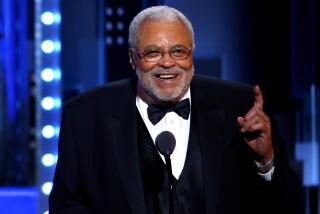‘One of our purposes is learning to speak without <i> ahs, ums, hums . . . ‘</i>
- Share via
“They say that people’s greatest fear after death is speaking before other people,” Juli Odum said, trying to put her finger on just what it is that makes a Toastmaster tick.
Although Odum--slender and bouncing with 40ish enthusiasm--seemed unlikely to find out very soon whether that will come to pass, she has faced and conquered her fear of public speaking before death--and also before 7 in the morning, which may be almost as tough.
Odum, a vice president of Motivated Toastmasters, was one of a dozen members who showed up before work Tuesday for the group’s weekly session in the back room of the International House of Pancakes in Van Nuys.
Motivated Toastmasters is a recent splinter of the area’s established Toastmasters group, which consists of 40 men and a waiting list. The goal of the new group’s mostly young, ambitious members is to teach each other how to express themselves in public.
At each meeting, several members are called upon to speak extemporaneously from their tables. Others give prepared talks that may last five to 20 minutes. Evaluators critique each speaker.
At the end, the designated counter gives the tally of the dreaded ahs .
“One of our purposes is learning to speak without ahs, ums, hums, any non-words,” Odum explained. “We’re not real mean about it in this club. Some fine five cents per ah . Some give them a tongue depressor. We’re kind in this club. We only stand up at the end and report the ahs that were said.”
Tuesday’s theme for extemporaneous talks, called Table Toppers, was motivation. The day’s Table Topics Master, Ann Schmitt, prompted each speaker with a quotation, usually of an inspirational bent.
“Our minds are like a parachute; they only work when opened,” Schmitt said to Babette Montana, a gemologist and image consultant. Montana soared with that.
“This life is fabulous,” she said breathlessly. “There is so much to offer. If our minds are open to the good, then we are most likely to experience it in our lives.”
The rules didn’t require speakers to stick to the topic. Sylvia Martin, a family counselor who joined Toastmasters to prepare for her master’s degree, was given the topic “you can have anything you want if you will show others how to get what they want.” She recounted a recent bad experience.
“My worst fear was realized,” Martin said. “And that was that I would give a speech and bomb out and I would do it in front of my husband, whom I have never spoken before.”
It worked out for the best, though.
“My husband said to me, ‘I really admire your guts,’ ” Martin said. “Now I’m OK. Now I can go on.”
The three main speakers picked remarkably intimate topics.
“Today I have an opportunity to give you a fresh-hand, knowledgeable, personal feeling of how it is to have a baby,” Bob Rebbe, a Van Nuys fire captain said in the opening speech.
Rebbe told, and acted out, the whole story, down to his wife’s fast breathing and the doctor’s grand entrance, reaching out to catch the baby like a football.
“I like to lighten it up,” Rebbe said. “Get the pressure off. . . . It was fun all the way through--for me.”
In the second talk, new member Betty Maithonis told of a 16-year saga in which she worked in a cannery and an oil-well cementing company, played the organ in a Methodist church in Oklahoma, taught piano in Oregon and married a dashing Greek, all because she decided to move to Phoenix in 1958 to escape the climate of her native Toronto.
She settled at last and, in 1974, finally got to Phoenix long enough to be glad that fate had taken her to Newhall instead.
“Unfortunately, the story does not end on this happy note,” Maithonis said. “A year later, I lost my husband and was left with three children, 11 years and under. With a little courage but a lot of faith, I carried on.”
Her touching story didn’t win the day’s trophy. It went to John Cleary, who spoke last. Cleary reviewed the history of the wars his family fought in, introducing each with a song.
“The mademoiselle from Armentieres,” he sang, marching in place. He described the feelings of pride and patriotism he carried from his father’s stories of World War I.
“World War II came, and I was involved, personally,” Cleary said. “I found out what the war was all about from the trenches, from the landing craft, from riding on ships and assaulting beaches, and from following through the aftermath of war, finding out how the enemy suffers.”
By Korea, “I did know what it was all about,” he said. “When the opportunity came to volunteer to go across the ocean, I said, ‘No.’ ”
Cleary’s son served on the aircraft carrier Ticonderoga and helped shell the beaches of Vietnam.
“War, full circle,” Cleary said. “I did my best--my wife, my family--to make my son feel that he was a welcome hero. He still had to fight a losing battle. The Vietnam War veterans are still trying to receive their place in the sky, their place in the light.”
By the fresh hour of 8:30, a lot had been said by a group of people who are almost as afraid of speaking as they are of death.
And there were very few ahs to report.
More to Read
Sign up for Essential California
The most important California stories and recommendations in your inbox every morning.
You may occasionally receive promotional content from the Los Angeles Times.










